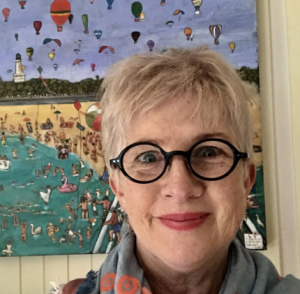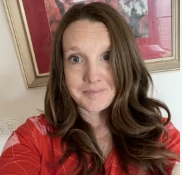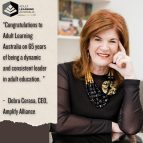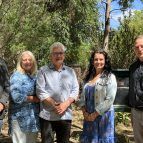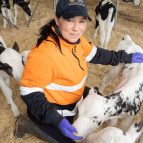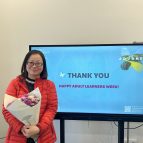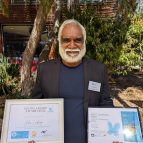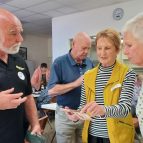Flagship journal in safe hands
 After seven years, Associate Professor Trace Ollis is stepping down as Editor of the Australian Journal of Adult Learning (AJAL), ALA’s flagship research publication. Trace looks back over her time as Editor and her career in adult and community education.
After seven years, Associate Professor Trace Ollis is stepping down as Editor of the Australian Journal of Adult Learning (AJAL), ALA’s flagship research publication. Trace looks back over her time as Editor and her career in adult and community education.
Since moving from TAFE teaching to academia, Trace Ollis has always ensured that adult learners’ voices are at the forefront of her research and teaching. “Their stories and voices are way more important than anything that I can say,” she told Quest.
Trace began her career in education, teaching community development and welfare studies within the TAFE system. During this time, she worked with people returning to study, refugees, women resuming study after having children, and single parents. She consistently saw the transformative power of adult learning in their lives.
After teaching for 12 years, Trace completed a Master’s in Training and Development, followed by a PhD before joining Deakin University in 2012. Currently, Associate Professor in Education (Applied Learning), Trace has made a significant contribution to how adult learning of all kinds transforms individual lives and communities.
She has published both nationally and internationally in this area. Her research is driven by social justice education, learner transformation, and issues related to lifelong learning, widening access and participation.
Trace was ALA Vice-President when she agreed to also take on the role as AJAL Editor in 2017. When celebrating its 60th anniversary in 2020, Trace reflected on the journal’s significance:
“AJAL has always nurtured the work of young scholars, backed by an active Editorial Board of esteemed adult education scholars within Australian and internationally. The journal’s publications have reflected the changing and evolving nature of adult education scholarship and history in the Australian and Asia Pacific context”.
Now, as AJAL celebrates its 65th anniversary and as she finishes her term, Trace retains a strong belief in AJAL’s continuing importance to the sector.
“It is a wonderful journal, and, after so many years, there are also amazing archives. I would strongly recommend anyone in the adult education sector take advantage of ALA membership so they can look at these. They are a record of social change and the history of adult learning in the community context in Australia and beyond”.
Trace says the Journal has always used a “double-blind peer” review process, involving two expert academics in the field. This ensures a rigorous evaluation of any contribution to the journal.
A further strength of AJAL, Trace says, is the “practitioner articles” which are non-refereed but draw on contributions from teachers and tutors about current issues in adult learning in the field. “We give people in the field at the grass roots level the ability to publish about practices and programs happening in the community. This is a unique feature of AJAL”.
AJAL also remains one of the few academic journals, Trace says, that are published through a peak body rather than a large publishing group with multiple focus areas. “ALA publishing by AJAL ensures that the socio-cultural history of the journal is maintained, including its deep connections with the adult learning sector”.
Committed to ensuring that her research is “immersed and engaged” with the work of the community adult education sector, Trace believes greater recognition is needed for the capacity of local education providers to meet the learning needs of their communities. She highlights their ability to respond to broader challenges, such as natural disasters like fires and floods and, particularly post- COVID, increasing financial insecurity.
“Adult community education providers are very responsive to everyday issues happening in society. They might be running formal education programs as well as groups promoting health and fitness etc. But, if they find out that the local community is having problems with something like food insecurity, for example, they will run programs to assist people”.
“The people managing and coordinating these providers and the teachers and tutors are pretty remarkable at being able to respond to the needs of their communities”.
Trace is also a strong advocate for greater recognition of how teachers in ACE place learners at the centre of their teaching, adapting pedagogy, lesson plans and support to meet their needs.
“There are so many learners who left school early, who have had a crisis interrupt their learning, who have never felt that they fitted into the formal system of schooling. Before they can learn, teachers have to reframe previous negative experiences and provide a great deal of care and support. There is a lot of transformative and reparative work being done to assist learners to gain confidence”.
Moving away from editing AJAL—though she will remain on the editorial board—Trace plans to focus on her research. She is set to publish a book in 2025 with ALA Vice President Annette Foley on lifelong learning and adult learning in a community context. Additionally, she will begin a new research project with Professor Vicky Duckworth in the UK, Transforming Adult Learner Lives Australia – watch this space.
New AJAL Co-Editors
ALA Board member and Lecturer in Deakin University’s School of Education, Dr Piper Rodd (below, right), and Dr Cheryl Ryan (below, left) also from the Deakin School of Education, have become Co-Editors of AJAL.
